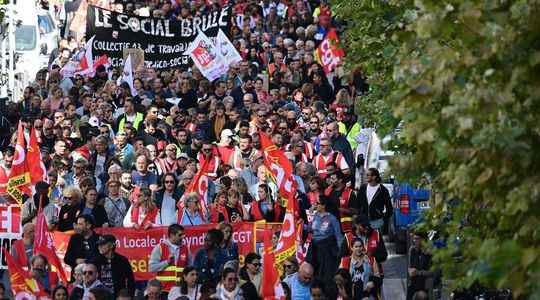To worry. Regain hope. Again, to see the clouds gathering. Since early October, the morale of the government has continued to yoyo in the face of the simmering social crisis. First, there was growing concern about fuel shortages, then the relief after the wage agreements at the big oil companies and the requisitions of refinery agents. Then, during the last weekend, the doubt again in front of the persistent blockages. Then there was the anguish at the idea that the march on Sunday October 16 “against high prices and climate inaction” at the call of the left-wing parties would degenerate. The relaxation in front of the 30,000 participants, then the renewed pessimism at the prospect that the day of interprofessional mobilization of October 18 at the call of four unions marks the beginning of a major movement.
Day after day, at the Elysée, Matignon, Bercy or Beauvau, we closely monitor the slightest outbreak of fever. Whether it is wage, linked to future reforms (pensions or unemployment insurance) or a simple bloodshed against too expensive living, there is no longer any question of being surprised as at the start of the strike in the refineries. Not easy as social France is escaping the evidence in this autumn of 2022, the day after presidential and legislative elections which have revealed deep fractures.
The recent survey by the Jean-Jaurès Foundation about discontent in France is enlightening in this respect: 58% of French people say they are “dissatisfied but not necessarily angry”. This figure could reassure the executive, tempted to say that a majority of citizens are not ready to take to the streets. But isn’t it a misinterpretation to classify them as “naturally dissatisfied”, “congenital complainers” and not among “future rebels”. Are they so far from the 36% of French people who say they are “dissatisfied and angry”? The porosity between these two France exists, since the latter group was only 31% in 2021, the date of the previous survey on “French fractures”, and has grown by five points in twelve months.
All it takes is a tiny spark…
Proof that the two worlds do not necessarily oppose each other, the recent movement around fuel has not aroused massive rejection among the victims of shortages. True, no one was happy to have to queue at gas stations. Employees in the professions most dependent on the car (nursing assistants, farmers, taxis and many others) expressed their anxieties at the idea of running out of fuel and Toussaint holidaymakers wondered about their ability to leave this Friday, October 21. But in the end, no one has expressed frank resentment against these blockages, launched however by a very unionized minority and not always popular. An Elabe poll for BFM TV carried out on October 11 and 12 at the height of the crisis attests to this: at that time, 42% of those questioned supported the mobilization when 40% criticized it. Above all, 62% felt that the situation of employees in the oil sector was not satisfactory and that profits should be shared more. Part of the French therefore seemed to judge that these strikers offered an expression by proxy to their “discontent without anger”, according to the term of the Jean-Jaurès Foundation. A fund of fed up which grows stronger over the months and years and which feeds on the loss of purchasing power due to inflation, on the idea that tomorrow, perhaps, we will have to work up to the age of 65, fears for employment.
And it is of course on this concern and this dissatisfaction that La France insoumise, la Nupes and the personalities who called to walk last Sunday intended to surf. They failed to gather beyond the usual demonstrators. Because certain labels or declarations – like the call for a “general strike” by Green Sandrine Rousseau – have served as a foil to anger that wants to be from another side. For their part, the yellow vests have never managed to catch their breath since the great movement of 2018, even if some of them were present on October 16. Should we therefore draw the conclusion that France is mostly placid? Risk. Because if social prediction is a delicate exercise and the big nights rarely where we expect them, recent history has taught us that they can arise unexpectedly. And that all it takes is a tiny spark for discontent to turn into outright anger.
